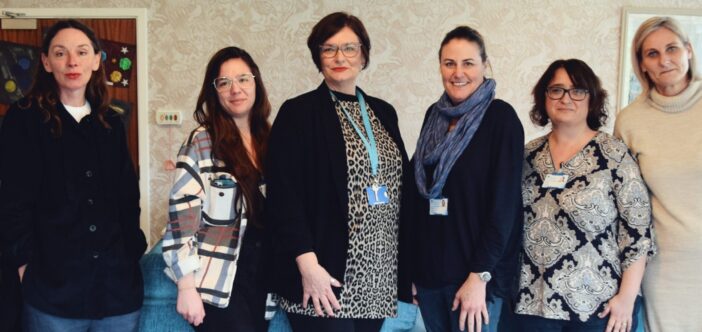Meet Pilgrims Hospices’ social work team

Pilgrims Hospices is proud to provide holistic, compassionate palliative care across east Kent. The charity supports people in many different ways, and social work is an integral part of this.
To celebrate World Social Work Day 2023, Sophie Van Walwyk, Head of Psychosocial, Wellbeing and Bereavement Services, and her team explain the vital role that social workers play within hospice care supporting patients, families and communities during uncertain and difficult times.
Sophie Van Walwyk, Social Work Lead
People often think that working at a hospice is challenging and sad. Sometimes it can be, but for me, supporting patients and their loved ones at the end of life is both an honour and a privilege.
My first experience of Pilgrims’ care was during my social work training when I shadowed the Ashford hospice team. I was so inspired by the practice I observed, which I felt reflected the core values of the social work profession. This left a lasting impression, and I began considering a career in palliative and end-of-life care.
I joined Pilgrims in 2015, initially as a social worker at the Thanet hospice, but soon progressing to the role of Lead Social Worker, managing teams across our three sites. My role continued to grow, and I’m now responsible for all teams providing psychological, social and spiritual care.
The psychosocial elements of hospice care are just as important as the care provided by our nurses and doctors. We consider the whole person, not just their illness or disease. We not only meet their physical needs, but also their psychological, social and spiritual needs.
Zoe Stoneham, Social Worker at Pilgrims Hospice Thanet
Palliative, end-of-life and bereavement care matters to everyone. Palliative social workers use their skills to help people deal with what is happening to them, including loss and grief. They also:
- Support people in expressing what’s important to them and encourage open conversations
- Coordinate care provisions
- Liaise between professionals
- Support with decision making
- Draw on legislation, if required
- Support with safeguarding of anyone who may be at risk of abuse/harm
I joined Pilgrims in 2016, having previously worked as a case manager in adult social services for Kent County Council. This role gave me many skills, which I was able to bring to Pilgrims.
I love being patient-facing and meeting people in the community, our Therapy Centres, clinics and on the ward. We offer practical help at home, signposting to other services, advocacy work, psychological support and discharge planning from our in-patient ward.
We’re also experienced in therapeutic work with patients and support carers with their wellbeing. I often signpost or refer to our in-house carers groups, which provide a safe space for carers to share their experiences with others in similar situations.
Clare Friel, Social Worker at Pilgrims Hospice Ashford
As a social worker, each day is different, which I love; there is an ever-present need to respond to the unexpected. I get to work alongside skilled colleagues from the multi-disciplinary team, and we’re constantly learning from each other.
I have regular opportunities to introduce myself to people at a time of heightened emotion, and I’m always awed by the generosity with which my support is received. I’m reminded daily of the brevity of life and the importance of empathy, self-determination and dignity.
Sophie Skardon, Social Worker at Pilgrims Hospice Canterbury
I joined Pilgrims in 2018 as a student social worker, and the experience stayed with me as I started my career. In 2021, I returned as a qualified social worker, based at the Canterbury hospice. We support both patients and their loved ones in so many ways. This can include navigating care pathways for support in the home, as well as offering advocacy and psychosocial support.
Pilgrims social workers are all members of the Association of Palliative Care Social Workers (APCSW).



